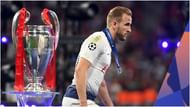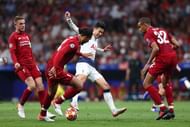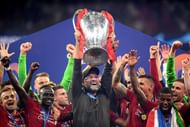
Twelve months later, since that dark and gloomy day for everyone associated with Liverpool when two Loris Karius howlers gifted Real Madrid their thirteenth Champions League title, the club assuaged all the pain, the suffering of that unforgettable ordeal by winning their sixth UEFA Champions League trophy in Madrid.
The game served poetic justice for Mo Salah whose shoulder injury had seen him leave the pitch in tears in last season’s final but it was his goal from the penalty spot that gave his side the decisive lead this time around. Divock Origi replacing Roberto Firmino in the second half sealed their historic win with yet another vital goal to add to his collection for this season.
Truth be told there wasn’t much to separate the two sides with both teams looking nervous, edgy and cautious, not wantin to take any unnecessary risks given the magnitude of such an occasion. This meant that the fans were treated to a dull, monotonous and sordid affair.
However, Spurs unsettled Liverpool in the second half as Pochettino ringed the changes that resulted into more space for the likes of Lucas Moura, Son,Origi and Eriksen to exploit, thus opening the game up, unlike the torrid first half.
Spurs, however, fell short of the finish line and now let us look at the three reasons why Pochettino’s men were unable to pass the last hurdle:
#1 Unlucky Moura makes way for Harry Kane:

Ever since Spurs booked a spot in the final of the Champions League, there was only one debate that dominated newspapers and discussions all over the world.
"Will Harry Kane’s return from injury see him thrust into the line-up straightaway?" rather than "Will Harry Kane be fit in time for the final?", as everyone is aware of his superhuman speedy recoveries from injuries and his miraculous early returns.
Then the question beckoned, "If Kane did indeed return to the starting line-up, who would Pochettino drop from his side?"
The unlucky candidate was none other than the Brazilian who, in the first place, had scored a hat-trick and a last-gasp winner against Ajax to dump the Dutch side out of the competition. However, such important contributions still couldn’t guarantee Lucas Moura of a first-team spot as he was harshly made the sacrificial lamb to accommodate the star striker.
The gamble though failed to pay dividends as Kane wasn’t as his sharpest as most would expect after a return from a lengthy spell on the sidelines. Joel Matip and Virgil Van Dijk dealt comfortably with his physical presence and did not give him a sniff all game. Kane is a different beast when he is fully fit and can drop effectively in the number 10 position and link up with his teammates. However, he looked leggy and failed to provide any sort of mobility.
Spurs could have benefited from Lucas Moura’s dribbling, uncanny runs, unpredictability, and spontaneity. He did eventually come on as the first change taking the place of the impressive Harry Winks, but Van Dijk and co stood tall to the task and made sure that they kept their counterparts at arm’s length.
#2 Quiet outing for the Spurs attackers

Early in the game, when Spurs went a goal down courtesy of a controversial and debatable penalty awarded to Liverpool as Moussa Sissoko was judged to be guilty of handball, it was the eighth time in the campaign that Spurs had conceded a goal in the opening seven minutes of the game.
This time, though, they couldn’t find the key to unlock the Liverpool defence. Sterile, slow, and uninspiring, the attack appeared out of sync and failed to fashion clear-cut opportunities. Christian Eriksen endured an uncharacteristically quiet game while Dele Alli impact was limited. Son was the only bright spot in the second half and managed to trouble the opposition with his direct running, quick feet, and industry.
However, Pochettino’s side did not offer the incisiveness and interwoven combination play that their highly talented frontline is so capable of displaying. Their lack of a cutting edge and inability to breach open the Liverpool fortress by taking adequate risks ultimately cost them the Champions League trophy.
#3 Brilliant game management by Liverpool

Liverpool were outclassed last season in the final by a Real Madrid team that Jurgen Klopp described as “streetsmart”. Their victory proved that they learned their lessons from their humbling defeat at the hands of the most successful side in European history. Taking an early lead through a Mo Salah penalty, Liverpool managed the game to perfection and showed that they are a different side to that swashbuckling, reckless, and high-scoring Liverpool side of previous years. This is an efficient, smart, mentally-strong, and disciplined side that doesn’t crumble when subjected to intense pressure.
Not even their strongest performance, but it was enough to defeat Spurs which is all you need to know about this champion Liverpool team. They were compact, hard to break down, and cut out passing lanes in midfield thus pressurizing the center backs to spray the ball out wide before pressing in numbers again minimizing the passing options for the man in possession. The north London side did not disrupt their organization and suffered as their transition from back to front was lethargic and sluggish.
Klopp’s men finally put the game to bed in the closing minutes of normal time as substitute Origi made sure that there would no special comeback this time around by their English rivals. With this Champions League victory, the German ends his losing streak of six in cup finals and Real Madrid’s stranglehold on the trophy, thereby placing Liverpool only one place behind AC Milan in terms of Champions League victories.
Klopp has brought home the silverware that this prestigious club most definitely deserved after a fantastic season.
